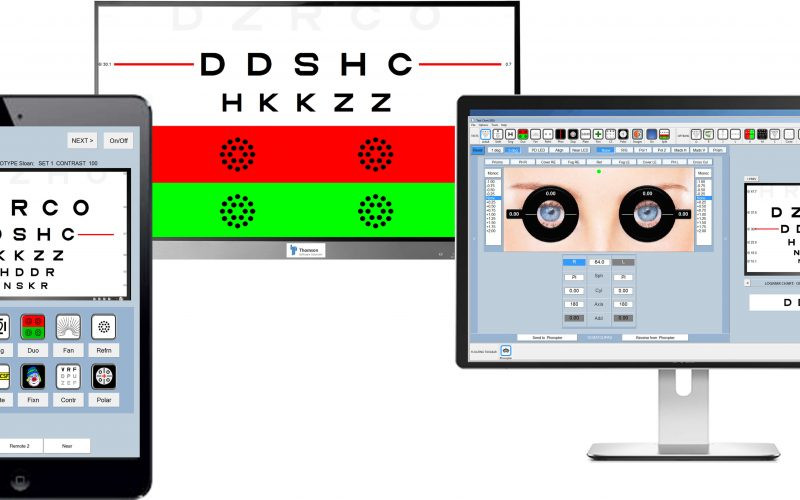The Eye Examination at Kent Eye Care
Regular eye examinations are a vital part of any health care programme. They are not only important for helping us maintain good vision but also in detecting conditions which may affect both our ocular and general health. Such conditions including Glaucoma, Cataracts, Diabetes, Macula degeneration, high blood pressure, high cholesterol all of which can have far reaching effects on our lives if left undiagnosed and treated.

Most adults will benefit from an eye examination every 2 years however certain people will require examinations more frequently i.e. children, diabetics, over 70 years or patients that have a family history of certain eye conditions such as glaucoma. At Kent Eye Care the eye examination is very comprehensive, unhurried and is tailored to your individual requirements. As a Specialist Optometric practice we are proud to be able to offer all our patients one of the most thorough and in-depth eye examinations in the whole of Kent and indeed the UK.
Dr Gurney is our clinical lead a Specialist Registered Independent Prescribing Optometrist and is the only Practitioner in Kent with nationally recognized Diplomas in Ocular therapeutics( DipTP IP) and Glaucoma( Dip Glauc) with this level of qualification in the whole of Kent), Dr Gurney is a member of the Community Ophthalmology Team and OPwSI(Optometrist with Special interest in Ophthalmology) as such he and his team work closely with the Consultant Ophthalmologists at Maidstone & Medway hospitals. We can therefore offer more specialist hospital standards of diagnostic care, treatment and examinations not available at high street and multiple opticians, who employ entry level opticians.
At Kent Eye Care our Eye Examination includes:
- Discussion of your medical and ocular history including any medications taken which may affect your eyes and vision
- Discussion of your lifestyle requirements i.e. Driving, Occupation, use of VDU equipment, etc.
- Assessment of your vision without spectacles or Contact lenses
- Retinoscopy: The eyes refractive status is measured by assessment of a reflex that is projected of the retina.
- Calculation of Spectacle Prescription: Different lenses are placed in position until the letters on our computerised test chart are as sharp as possible.
- Binocular Vision Assessment: Vision correction involves not just rectifying obvious focusing errors such as long, short sight or astigmatism, but also correcting other imbalances in the visual system, such as muscle weakness or poor eye coordination. The latter are also frequent causes of discomfort and eyestrain, but are often overlooked.
Other tests our specialist may perform depending on clinical necessity are...
Indirect Ophthalmoscopy
This is the examination of the back of the eyes, and is normally carried out in Eye Hospitals by a Consultant Ophthalmologist. Our Optometrists carry out this technique using a special Volk Lens which gives us a wider view of the back of the eye.
This lens also allows us to view the peripheral retina more thoroughly as well as giving us a three dimensional image. From this, we can view any raised areas on the retina which isn’t possible with the traditional hand-held direct Ophthalmoscopes used at most High Street Opticians.
Slit Lamp Bio-microscopy
We use a special hospital standard Haig Strait slit lamp bio-microscope this allows our optometrists a 3 dimensional view of both the front and middle structures of your eyes. Helping them to detect subtle changes to the cornea, iris and lens of your eye (i.e. dry eye and cataract).
Tonometry (Eye Pressure Test)
We use one of the latest air-puff optical machines to measure the intra ocular pressure within your eye, raised eye pressure can be an indicator of glaucoma.
Hospital Standard Fields
Our Humphrey HFA3 830 Visual Field analyzer is one of the very latest and regarded as one of most accurate machine available to measure the sensitivity and extent of your visual field. Our Humphrey Visual Field analyzer is even better than most used within hospital eye departments.
The test is painless and involves flashing a series of random lights in your peripheral vision at varying levels of brightness. You are required to respond every time you see a flash of light by the press of a button. The machine prints out the results showing us how wide and sensitive your field of vision is. This test takes about 3 minutes per eye. An in depth visual field examination with our Humphrey machine can help pick up glaucoma and many neurologically conditions such as brain tumor’s at an early stage ,which obviously has major benefits for the patient.
OCT
Optical Coherence Tomography (OCT) is a non-contact medical imaging technology similar to ultrasound and MRI. With OCT, reflected light is used to produce detailed cross-sectional and 3D images of the eye.
Kent Eye Care can offer you a scan as part of your examination using one of worlds most advanced and newest generation 3D OCT devices (Better than found in many hospitals eye departments). Our Topcon 3D -1 Maestro OCT can pick up changes within the retina up to few thousandths of a millimetre. Our Optometrists can therefore detect and monitor conditions such as Glaucoma, macula degeneration, diabetic eye changes, optic nerve and corneal diseases earlier than we could ever dream of in the past, ensuring you peace of mind that your eyes are healthy.
If a problem is detected then very early intervention and treatment by a Specialist Optometrist or Ophthalmologist can be instigated.
Fundus Photography
Our Topcon Maestro captures high quality Fundus photos which can be extremely useful in the detection and monitoring of various medical conditions, including glaucoma, high blood pressure, multiple sclerosis, and more. Fundus photography is completely painless, doesn’t typically require dilation of the pupils, and delivers extremely detailed and accurate results.
